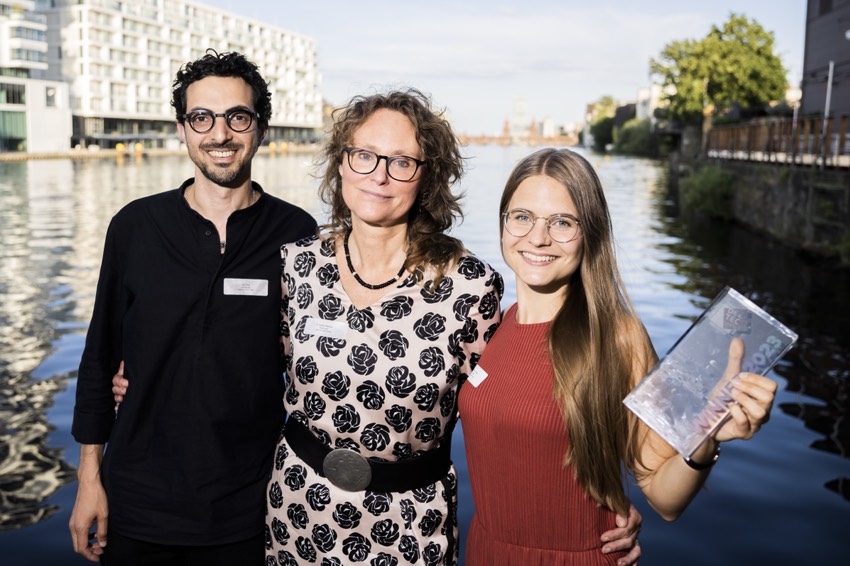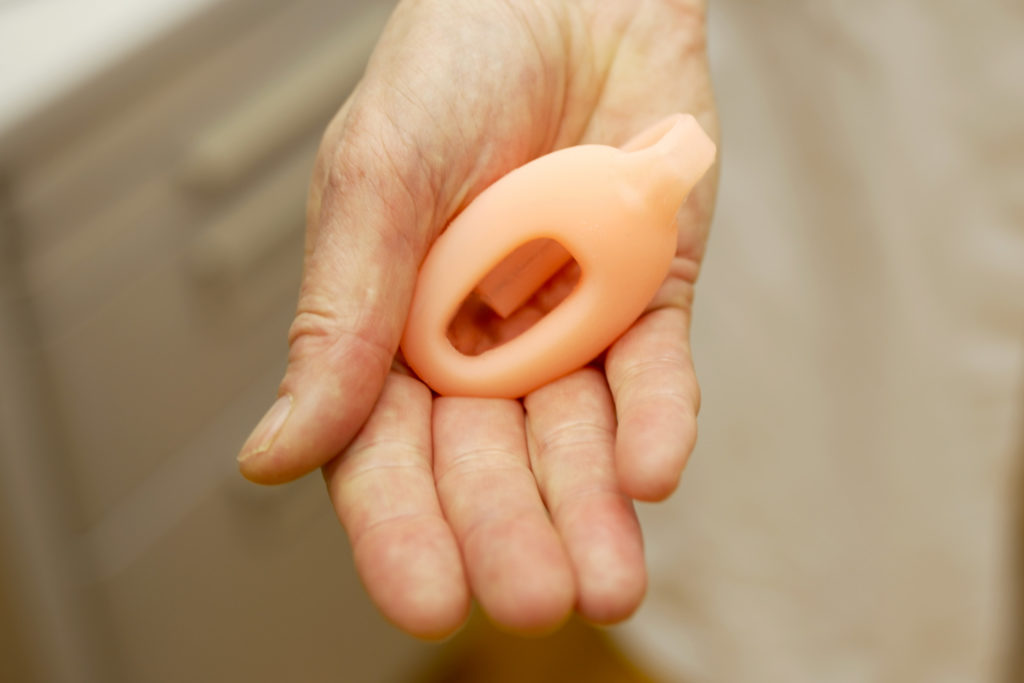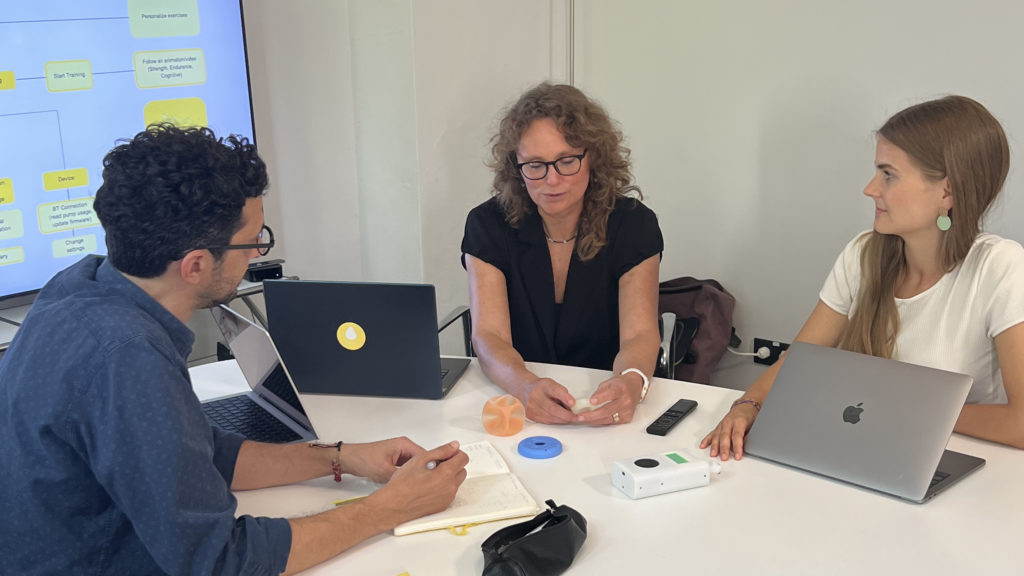
13 Mar Why you might need a bra for your pelvic floor — A conversation with alumni and Femtech startup Yeda
Let’s do a small test: raise your (digital) hand if you’ve already heard of pelvic floor weakness or dysfunction. While many women might know the symptoms, they may often think that this is something normal they just have to live with, and are unfamiliar with the root causes or even much less the solutions.
Yeda (formerly called YoniCore, alumni cohort 1) is here to revolutionize that. For International Women’s Day, we caught up with two of their co-founders Anna Maria Ullmann and Yair Kira to discuss their product, recent iterations, and the freshly launched Kickstarter campaign.
Every second women 25 and older – that’s 1 billion women worldwide, are affected by pelvic floor weakness. The condition causes the muscles, ligaments, and connective tissues in the pelvic region to lose their strength and ability to provide proper support to the organs in the pelvic area, including the bladder, uterus, and rectum. “Women that recently gave birth are most affected, as well as those in their menopause”, explains Anna Maria. “As the body undergoes hormonal changes, estrogen weighs off, which plays a crucial role in maintaining the elasticity and strength of the pelvic floor muscles and ligaments.” Common consequences include urinary and fecal incontinence, pelvic pain, inner discomfort, and sexual dysfunction.
How does it work? “Yeda is an inflatable silicone form that is placed inside the vagina, over the pelvic floor muscles, and below the bladder and uterus, akin to how you insert a tampon or menstruation cup. The solution physically supports the pelvic floor organs, which is why Yeda sees the correlation with a sports bra: It is an easy garment that keeps your organs in place; you can adjust it to your body, and most importantly, you decide for yourself if and when you want to wear it.”

Yeda’s solution is not only user-friendly, it’s also timely. Current alternatives don’t offer a complete solution. “The most common “solutions”, explains Yair, are either absorbing pads, which just hide the problem and act as diapers, or surgeries, which are very invasive. The best way is to train the pelvic muscles, but this needs very focused training and will take time to see results.”
Yair: “Already when we investigated the problem space in the Vision Health Pioneers Incubator did we learn that when women approach their doctors/gynecologists, they are often directed to the pelvic floor centers in hospitals. In these centers, they may be recommended surgical interventions. There are different reasons for it – either economical or simply because doctors like to do surgeries. It might sound awkward, but similarly to an artist who is an expert in sculpting and likes to make sculptures, surgeons like to operate. More than that, even when the guidelines dictate to start with the most conservative treatment and only when that doesn’t work, to try more invasive treatments – doctors will start with surgery as the first treatment.” Yair believes that their easy solution could become a viable alternative offered by gynecologists so that patients don’t have to go through surgery unnecessarily. “This way, women can reclaim control over their own health and wellbeing.”
Competitive edge through a phygital solution and friendly user experience
While the team aims to develop a medical product, Yeda will initially launch a lifestyle product. It’s a “phygital” solution, combining a hardware device – that provides instant relief of pelvic floor symptoms, with a digital training companion. “This combination makes us truly unique,” says Anna Maria, “and we’re the only company globally that combines both. Additionally, the device adapts to each body form. As an inflatable device, you have the flexibility to decide how much inflation is comfortable or necessary for you while wearing it. This eliminates the need for sizing consultations with a doctor or gynecologist, streamlining the user experience.”
“We call it the first adjustable bra for the pelvic floor”
“We call it the first adjustable bra for the pelvic floor”, adds Yair. “It’s a versatile support device designed for women to wear whenever they need it, whether for sports, work, or throughout the entire day. Women have the freedom to choose when and how long they want to use it.”
By the end of the year, Yeda plans to launch a basic MVP (Minimum Viable Product) through their freshly announced Kickstarter campaign. The initial product includes a hand pump and a single chamber in an inflatable ring-like form. The Kickstarter community will provide valuable data and feedback, enabling the team to enhance and develop an improved product version based on user experiences. “In the next phase, we will start involving medical professionals. Now we’re focusing on physiotherapists and midwives who are also not in the reimbursement cycle. Once we launch our medical device, the product will also become more attractive to gynecologists.”
Breaking the taboo
As with many women’s health issues, there’s still a lot of taboo surrounding pelvic floor dysfunction. “People don’t talk about it”, states Anna. “It’s just being hushed about because it’s a topic of shame. I had no idea, even though I’m a woman, that every second woman is affected. I had no idea that one of my best friends was affected because she never mentioned it.”
“Unfortunately today, women don’t openly say how “I’m peeing my pants whenever I sneeze.” But let’s change that, let’s talk about it. Years ago, it started with periods. Where I was just like, hey, let’s talk about menstruation. It’s natural and every second person on this planet does it – or used to or will – so we need to talk about it. That’s one of our approaches, just to say, “Pee your pants, it’s nothing to stay quiet about – just go talk about it.”
Yair adds that “gynecologists themselves often lack awareness about available treatments, contributing to a gap in knowledge. Many younger women may not realize the connection between their current experiences and potential implications for their future health, as bodily functions evolve throughout various life phases.”
Anna, who suffers from endometriosis, experienced first-hand the lack of understanding, even among health professionals, that left her feeling as if her experiences were not valid: “It’s frustrating how women’s health issues, particularly pain during periods or menstruation, are often downplayed. For ages, women have been told that such discomfort is normal, even by professionals like gynecologists. There’s a systemic issue at play, with a lack of information reaching these professionals. It’s crucial to change this narrative, ensuring gynecologists receive comprehensive education on conditions like endometriosis, perhaps starting with dedicated lessons at university.”

Listen, learn, don’t mansplain
I asked Yair how it’s been for him as a man dedicating this life to solving women’s problems. “I’ve had all kinds of reactions – from people rolling their eyes to being positively received. I don’t have any issue with that. I think it’s because I am authentically interested in the problem. I’m interested in learning and not explaining. So I know that whatever I talk about this topic with a woman, I’m always the one who knows less. I believe this is the way to go into every topic because ultimately, every person is different and you can learn from their diverse experiences.”
“It helps to have a diverse team – we have different perspectives and it makes the overall discussion more fruitful. Sometimes I make mistakes or say things wrong. If you want to go forward, you need to be brave enough to know that you will sometimes be wrong, or might hurt somebody’s feelings, but I’m accepting this because I have honest intentions, I try to be as respectful as I can, and this is my way to learn. In my eyes, today, part of being a gentleman is to be feminist”.
“I’ve been amazed to see just how many women talk with me openly about this. Sometimes they were also surprised themselves. It often occured that we were at an event and got into conversations where they realized “Oh, wow, I never talked about this issue with anyone.” I think once you open the conversation about these issues, you contribute to normalizing the topic for others as well. On the other hand, I’m always amused when men understand what we are doing, they tell me that they have nothing to do with it. That’s when I like to show them how it is very relevant for them – even just for the fact that they once started their life inside their mother’s pelvic floor” (Yair smiles).
Consider supporting Yeda’s Kickstarter crowdfunding campaign. The team has also opened their pre-seed € 350,000 round to help bring the product to market. Interested? Reach out to Anna Ullmann at ania@yonicore.com to schedule a meeting!
Applications to the 7th cohort of Vision Health Pioneers Incubator are now open! Apply by April 3!
Thanks to the team for the interview, we wish them well on their journey!



